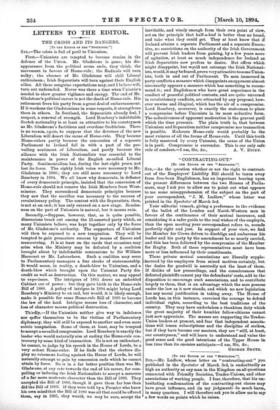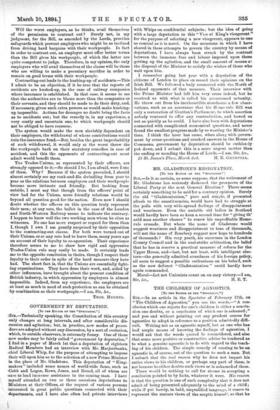[To THE EDITOR OF THE "SPECTATOR."] Sul,—Mr. Ludlow, whose letter
on " contracting-out " you published in the Spectator of March 3rd, is undoubtedly as high an authority as any man in the Kingdom on all questions connected with Friendly Societies, Trades-Unions, and other associations of working people. I fear, therefore, that his un- hesitating condemnation of the contracting-out clause may have great influence, and (in my judgment) do much harm,. in many quarters. I will therefore ask you to allow me to say a few words on points which he raises.
Will the worst employers, as he thinks, avail themselves -of the permission to contract out P Surely not, in my judgment, for the Bill, as amended by the Lords, provides -safeguards which prevent employers who might be so inclined from driving hard bargains with their workpeople. In fact in order to contract out, an employer must offer better terms than the Bill gives his workpeople, of which the latter are quite competent to judge. Therefore, in my opinion, the only employers who will avail themselves of the clause will be those who are willing to make a pecuniary sacrifice in order to remain on good terms with their workpeople.
Contracting-out leads to the hashing-up of accidents.—This I admit to be an objection, if it be true that the reports of aocidents are hushed-up, in the case of railway companies where insurance is established. In that case, it seems to me that the authorities are to blame more than the companies or their servants, and they should be made to do their duty, and, if necessary, given such extra powers as would make hushing- op impossible. Actions for damages no doubt bring the facts as to accidents out; but the remedy is, in my experience, a .very costly and uncertain one, to which workpeople should not be obliged to have recourse.
The system would make the men slavishly dependent on their employers, the withdrawal of whose contributions would ruin the insurance fund.—But, besides the great improbability of such withdrawal, it would only at the worst throw the the workpeople back on their statutory remedies in case of accident, and this the opponents of contracting-out must admit would benefit them.
The Trades-Unions, as represented by their officers, are strongly opposed to it.—So should I be, lam afraid, were I one -of them. Why Because if the system prevailed, I should almost certainly see my rank-and-file dwindling from year to year as the relations between employers and their workpeople become more intimate and friendly. But looking from -outside, I must say that though from the officers' point of view bad for the Unions, more friendly relations would be 'beyond all question good for the nation. Even now I should -doubt whether the officers on this question truly represent their men; at any rate, the ballot in the case of the London and North-Western Railway seems to indicate the contrary. I happen to know well the two working men whom he cites as -witnesses. No one has more respect or regard for them than I, though I own I am greatly surprised by their opposition to the contracting-out clause. For both were turned out of their Unions, or at any rate had to leave them, many years ago on account of their loyalty to co-operation. Their experience therefore seems to me to show how rigid and oppressive Trades-Union rule may easily be made. It certainly leads me to the opposite conclusion to theirs, though I respect their. loyalty to their order in spite of the hard measure they have had. The short fact is, that the Unions are essentially fight- -lug organisations. They have done their work, and, aided by -other influences, have brought about the present condition of British industry, in which oppression by employers is almost -impossible. Indeed, from my experience, the employers are -at least as much in need of such protection as can be obtained by Combination as their workpeople.—I am, Sir, &c.,
THOS. HUGHES.







































 Previous page
Previous page